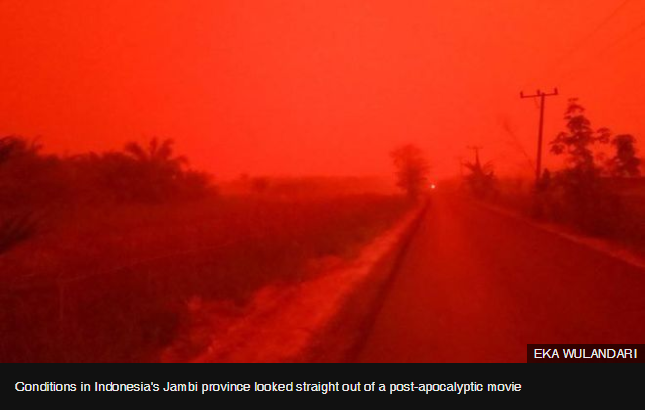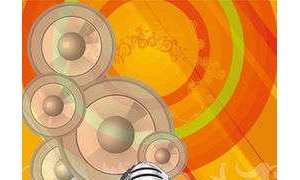Skies over an Indonesian province turned red over the weekend, thanks to the widespread forest fires which have plagued huge parts of the country.
印度尼西亚爆发了大规模森林火灾,影响了该国大部分地区,周末一个省上方的天空变成了红色。
One resident in Jambi province, who captured pictures of the sky, said the haze had "hurt her eyes and throat".
占碑省一个居民拍摄了天空的照片,她说雾霾“损害了她的眼睛和喉咙”。

Every year, fires in Indonesia create a smoky haze that can end up blanketing the entire South East Asian region.
每年印度尼西亚的大火都会产生烟雾,最终可能会覆盖整个东南亚地区。
A meteorology expert told the BBC the unusual sky was caused by a phenomenon known as Rayleigh scattering.
一位气象专家对BBC说一种被称为瑞利散射(一种光学现象)的现象导致天空出现如此不寻常的景象。
Eka Wulandari, from the Mekar Sari village in Jambi province, captured the blood-red skies in a series of photos taken at around midday on Saturday.
占碑省梅卡尔萨里村的Eka Wulandari在周六中午时分拍摄到了一系列血红色天空的照片。
The haze conditions had been especially "thick that [day]", she said.
她说那天的雾霾特别“浓”。
The 21-year-old posted the pictures on Facebook. They have since been shared more than 34,000 times.
这位21岁的女孩在Facebook上上传了这些照片,被转发34,000多次。
But she told BBC Indonesian that many online had doubted whether or not the photos were real.
但她对印度尼西亚的BBC说网上有很多人怀疑这些照片是不是真的。
"But it's true. [It's a] real photo and video that I took with my phone," she said, adding that haze conditions remained severe on Monday.
她说:“但这些是真的,都是我用手机拍的真实照片和视频。”她还补充说周一雾霾依然很严重。
Another Twitter user posted a video showing similarly coloured skies.
另外一个推特用户上传了一段类似颜色天空的视频。
"This is not Mars. this is Jambi," said user Zuni Shofi Yatun Nisa. "We humans need clean air, not smoke."
推特用户Zuni Shofi Yatun Nisa说:“这不是火星,是占碑。我们人类需要清新的空气,不要烟。”
Indonesia meteorological agency BMKG said satellite imagery revealed numerous hot spots and "thick smoke distribution" in the area around the Jambi region.
印度尼西亚气象局BMKG称卫星图像显示占碑地区附近有许多热点和“浓烟分布”。
Associate Professor Koh Tieh Yong, of the Singapore University of Social Sciences, explained that this phenomenon, known as Rayleigh scattering, has to do with certain types of particles that are present during a period of haze.
新跃社科大学副教授Koh Tieh Yong解释说这种被称为瑞利散射的现象与雾霾中存在的某些类型的粒子有关。
"In the smoke haze, the most abundant particles are around 1 micrometre in size, but these particles do not change the colour of the light we see," he told the BBC.
他对BBC说:“雾霾中含量最高的粒子约1微米,但这些粒子不会改变我们所看到的光的颜色。”
"There are also smaller particles, around 0.05 micrometres or less, that don't make up a lot of the haze but are still somewhat more abundant during a haze period [than a normal non-haze period]... but this is enough to give an extra tendency to scatter red light more in the forward and backward directions than blue light - and that is why would you see more red than blue."
“还有一些更小的粒子约0.05微米或更小,不是雾霾的主要成分,但(与非雾霾时期相比)在雾霾期间含量会增多,足以使红光在向前和向后的方向上比蓝光更容易散射,所以你看到的红色比蓝色更多。”







